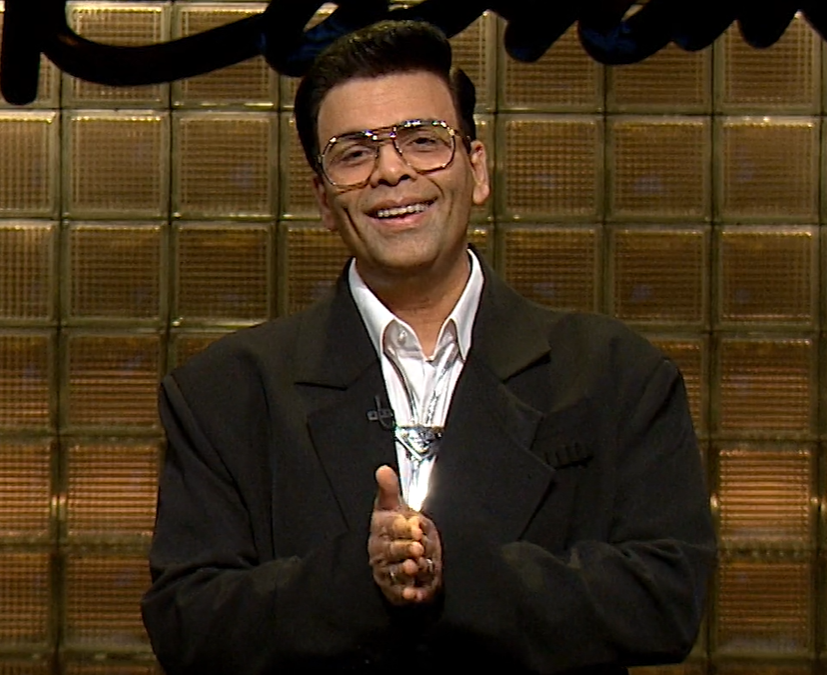Source: Stills from Koffee with Karan Season 8 (Disney+Hotstar)
Karan Johar is a notable Indian filmmaker and television personality commonly known by the nickname KJo. He is prominently involved in the Hindi cinema industry, playing a pivotal role in launching the careers of numerous successful actors through his production company, Dharma Productions.
Johar also takes on the role of host in “Koffee with Karan,” a talk show that features interviews with prominent figures from the Hindi film industry, including actors, directors, and producers.
Nepotism is the use of power or influence to favor relatives, friends, or associates in an occupation or field.
The term ‘nepotism’ gained popularity in India after actress Kangana Ranaut called Karan Johar ‘the flag bearer of nepotism’ on his chat show ‘Koffee with Karan.’
Ever since he was called out by Kangana in 2017, Karan Johar has been defending nepotism in various ways on the same chat show.
Let’s examine Karan Johar’s journey with nepotism to gain a complete context.
In 2011, in the third season of Koffee With Karan, John Abraham referred to Karan Johar as ‘clannish.’
Way before Kangana called out his favoritism, actor John Abraham had called him ‘clannish’.
During the infamous rapid-fire round, Karan has asked John, “Aamir, Salman, Shah Rukh – according to you (who is) the Khan of all seasons?” and “who would you put your money on-Ranbir, Imran or Shahid?”
To this, the actor had replied,
You are very clannish. Why are you so clannish? Why can’t it be the Kumars or Devgns? Ajay Devgn has given the biggest hits. There are other people who exist.
In the 2014 interview with Anupama Chopra on The Front Row, Karan Johar admitted that he is guilty of nepotism.
In an interview which aired on Star World, Karan Johar openly acknowledged the prevalent existence of nepotism in Bollywood, describing it as the ‘sad truth.’ He said,
There are too many factors that determine movie stardom, and true talent is least of them.
Reflecting on his choice of Alia Bhatt for his romantic comedy, Karan Johar admitted,
I picked up a chubby girl, I don’t know why. But I saw something. Maybe the fact that she was Mahesh Bhatt’s daughter also excited me. I could say no now, but it may have been a very strong sub layer. And that is nepotism, and we are guilty. I am guilty.
You can read more about this interview in the link below.
https://www.buzzfeed.com/srishtidixit/2014-karan-johar-front-row
Kangana Ranaut called Karan Johar “the flagbearer of nepotism,” when she made an appearance on his chat show in February 2017.
When asked to identify the individual in the industry who displayed the “most unnecessary attitude”, Kangana replied,
I think you Karan. In my biopic, if ever it’s made, you’ll play that stereotypical Bollywood biggie, who is like you know…very snooty and completely intolerant towards outsiders, flag bearer of nepotism, the movie mafia.
Johar responded to Ranaut in London while attending the LSE India Forum 2017, organized by the Students Union of the London School of Economics.
He said,
When she says ‘flag bearer of nepotism’, I don’t think she has understood the entire meaning of the term. What is nepotism? Am I working with my nieces, nephews, daughters, cousins?
What does she (Kangana Ranat) think we’re doing? Sitting and not giving her work? Maybe, I’m not interested in working with her. That doesn’t make me ‘movie mafia’, that makes me a man with an opinion.
I’m done with Kangana playing the woman card and the victim card. You cannot be this victim at every given point of time who has a sad story to tell about how you have been terrorised by the bad world of the industry. If it’s so bad, leave it.
Ranaut responded to that in her Mumbai Mirror interview.
Kangana responded,
Why is Karan Johar trying to shame a woman for being a woman? What is this about the ‘woman card’ and the ‘victim card’? This kind of talk is demeaning to all women, particularly the vulnerable because they are the ones who really need to use them.
It can be used as a cry for help when you sense a threat. The same goes for the ‘victim card’, which women like my sister, Rangoli, who is a victim of an acid attack, can use while fighting for justice in court.
She added,
I use every card possible. At the workplace, it’s the badass card to fight cutthroat competition. With my family and loved ones, it’s the love card. When fighting the world, it’s the dignity card, and for a seat in a bus, it’s the woman card. What is important to understand is that we are not fighting people, we are fighting a mentality. I am not fighting Karan Johar, I am fighting male chauvinism.
IIFA Awards July 2017: Karan Johar and actors Saif Ali Khan and Varun Dhawan chanted “Nepotism rocks”.
“You are here because of your Papa,” Saif Ali Khan said. To which Varun Dhawan responded, “And you’re here because of your mummy.” Karan Johar added, “I am here because of my Papa.” The trio then said in unison: “Nepotism rocks.”
The trio then broke into Kabhi Khushi Kabhi Gham song, ‘Bole Churiyan, Bole Kangana’, to which Karan said “Kangana na hi bole toh accha hai (It’s better if Kangana doesn’t speak).”
Karan Johar apologised in an interview with NDTV.
On Twitter, a wave of criticism ensued, labeling the remarks made by the three men as unfunny and calling them out for joking about Kangana in her absence.
Karan said,
This is something that I need to say and to clarify. Of course, I do not believe that nepotism rocks. Of course, I believe that only talent and hard work rocks.
What we said was meant to be a joke, and I think it was misplaced, misunderstood and I think it went wrong. I regret it. The idea of that joke was entirely mine, so I take total onus. I think we went a bit far with the Kangana mention.
Karan added,
No matter what I feel about what Kangana said on my talk show, I feel that I was raised to be a dignified, chivalrous and decent person. That’s the upbringing that I was given, and I feel that I failed on those accounts. No matter what my thoughts or personal issues on this, I should not have repeatedly brought up this issue. So for that, I am deeply regretful.
Mr Johar also addressed the charge of nepotism in his column for NDTV.com
He wrote,
I want to once and for all say and close this chapter after this and subsequently I will not speak about nepotism nor Kangana because it would be distrustful for her and it would be ungraceful at my end, which I’ve already been. Nepotism is easy access, nobody can deny that, but what you do with that access is what moulds you into a professional.
You can read more about this in the link below.
https://www.ndtv.com/opinion/karan-affairs-in-defence-of-my-nepotism-1674657
But did he actually stop? No. He continued to bring up nepotism in almost all seasons of “Koffee with Karan” after that.
He now calls it the ‘N-word’. He puts his guests on the spot and asks them, especially outsiders, about nepotism, for which they give very diplomatic answers.
Karan Johar, in many ways, represents the nature of Bollywood itself.
Karan Johar cannot accept criticism.
He already acknowledged nepotism in 2014. But when someone else pointed it out, his ego was hurt. He now defends nepotism at every given opportunity.
He defends his favorites no matter what.
When it comes to his favorites, his values no longer exist. For example, he has no problem with Ranbir Kapoor, even after Kapoor made openly and publicly problematic sexist remarks, despite Karan Johar claiming to stand for women.
In fact, Johar has tried to whitewash Kapoor’s image on his chat show many times by saying good things about him.
Success over Everything
Even when he claims to be chivalrous and apologizes for movies that depict women in a certain way, his pursuit of success often overshadows his principles.
He demonstrates this by expressing admiration for Sandeep Reddy Vanga’s film “Animal,” despite its criticism for its misogynistic narrative and violence.
Karan Johar is classist.
Karan Johar uses his show as a tool to mock people outside his circle. He rarely gives opportunities to outsiders or launches them as leads in his movies. Many people have called him out on this behavior, even on his show.
Making movies mocking homosexuality
Despite being part of a sexual minority group in a country like India, Johar’s films have often mocked homosexual relationships, using them for laughter and entertainment value.
Whether in “Humpty Sharma ki Dulhania” (HSKD), “Dostana”, “Kal Ho Na Ho”, or “Student of the Year”, most gay characters are depicted in a comedic light.

